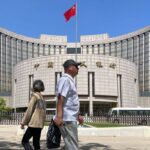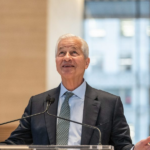Asian stocks paused their recent three-day rally, facing a decline on Tuesday that reflected weakening risk sentiment, leading to a surge in the US dollar. The MSCI Asia Pacific Index slipped 1.1%, with benchmark indices in Japan, South Korea, and Australia all experiencing declines. Hong Kong’s Hang Seng index was on track for its worst day in approximately two months. Simultaneously, European stock futures edged lower, extending the decline from the previous session, following comments from European Central Bank officials tempering expectations of rapid rate cuts. US equity futures also slipped in response.
Gold prices dipped, and bonds fell across the curve on the first trading day since Friday. The 10-year Treasury yields rose around six basis points, while those for the policy-sensitive 2-year debt advanced by the same amount.

The rise in US yields contributed to the strengthening of the dollar, marking its third consecutive session gain against major currencies. Traders are now closely watching Federal Reserve Governor Christopher Waller’s speech on Tuesday to assess if there will be resistance to expectations of a rate cut in March.
Mingze Wu, a currency trader at Stonex Financial Pte. in Singapore, suggested that the market might be realizing that the Fed may not cut rates at all this year, leading to a shift in sentiment.
In the oil market, prices remained stable despite continued Houthi attacks on ships in the Red Sea, contributing to elevated tensions in the Middle East. Global benchmark Brent held above $78 a barrel, while West Texas Intermediate traded below $73. Analysts emphasized that despite the conflicts affecting Red Sea routes, global oil supplies have not been significantly impacted. Attention is now turning to key economic data releases from the US and China to gauge potential demand.
In Germany, bunds fell on Monday, highlighting a discrepancy between market expectations of ECB rate cuts and a less optimistic outlook among economists. While the market is pricing in around six cuts, economists polled by Bloomberg consider four 25 basis point reductions as a more realistic scenario. ECB Governing Council member Robert Holzmann suggested that cuts this year were not assured, citing lingering inflation and geopolitical risks.
China-focused developments include Ping An Bank Co. listing 41 firms eligible for funding support to aid the nation’s struggling property sector. Additionally, China’s sovereign wealth fund has pledged to assist with risk mitigation and market stabilization in 2024. Some investors are turning bullish on Chinese stocks, with Bell Asset Management Ltd. now seeing value in the market after being neutral for the past three quarters.
Key events in global markets this week include Germany’s CPI and ZEW survey expectations, UK unemployment data, earnings reports from Goldman Sachs Group Inc. and Morgan Stanley, and key economic releases from China, the Eurozone, and the US.









